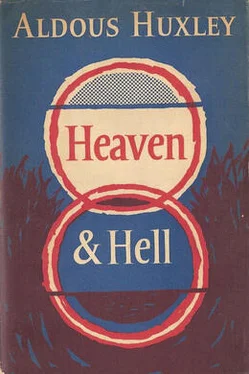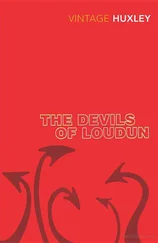Similarly George Russell writes of seeing the world illumined by 'an intolerable lustre of light'; of finding himself looking at 'landscapes as lovely as a lost Eden'; of beholding a world where the 'colours were brighter and purer, and yet made a softer harmony.' Again, 'the winds were sparkling and diamond clear, and yet full of colour as an opal, as they glittered through the valley, and I knew the Golden Age was all about me, and it was we who had been blind to it, but that it had never passed away from the world.'
Many similar descriptions are to be found in the poets and in the literature of religious mysticism. One thinks, for example, of Wordsworth's Ode on the Intimations of Immortality in Early Childhood ; of certain lyrics by George Herbert and Henry Vaughan; of Traherne's Centuries of Meditations ; of the passage in his autobiography, where Father Surin describes the miraculous transformation of an enclosed convent garden into a fragment of heaven.
Praeternatural light and colour are common to all visionary experiences. And along with light and colour there goes, in every case, a recognition of heightened significance. The self–luminous objects which we see in the mind's antipodes possess a meaning, and this meaning is, in some sort, as intense as their colour. Significance here is identical with being; for, at the mind's antipodes, objects do not stand for anything but themselves. The images which appear in the nearer reaches of the collective subconscious have meaning in relation to the basic facts of human experience; but here, at the limits of the visionary world, we are confronted by facts which, like the facts of external nature, are independent of man, both individually and collectively, and exist in their own right. And their meaning consists precisely in this, that they are intensely themselves and, being intensely themselves, are manifestations of the essential givenness, the non–human otherness of the universe.
* * * * *
Light, colour and significance do not exist in isolation. They modify, or are manifested by, objects. Are there any special classes of objects common to most visionary experiences? The answer is: Yes, there are. Under mescalin and hypnosis, as well as in spontaneous visions, certain classes of perceptual experiences turn up again and again.
The typical mescalin or lysergic acid experience begins with perceptions of coloured, moving, living geometrical forms. In time, pure geometry becomes concrete, and the visionary perceives, not patterns, but patterned things, such as carpets, carvings, mosaics. These give place to vast and complicated buildings, in the midst of landscapes, which change continuously, passing from richness to more intensely coloured richness, from grandeur to deepening grandeur. Heroic figures, of the kind that Blake called 'The Seraphim,' may make their appearance, alone or in multitudes. Fabulous animals move across the scene. Everything is novel and amazing. Almost never does the visionary see anything that reminds him of his own past. He is not remembering scenes, persons or objects, and he is not inventing them; he is looking on at a new creation.
The raw material for this creation is provided by the visual experiences of ordinary life; but the moulding of this material into forms is the work of someone who is most certainly not the self, who originally had the experiences, or who later recalled and reflected upon them. They are (to quote the words used by Dr J. R. Smythies in a recent paper in the American Journal of Psychiatry ) 'the work of a highly differentiated mental compartment, without any apparent connection, emotional or volitional, with the aims, interests, or feelings of the person concerned.'
Here, in quotation or condensed paraphrase, is Weir Mitchell's account of the visionary world to which he was transported by peyote, the cactus which is the natural source of mescalin.
At his entry into that world he saw a host of 'star points' and what looked like 'fragments of stained glass.' Then came 'delicate floating films of colour.' These were displaced by an 'abrupt rush of countless points of white light,' sweeping across the field of vision. Next there were zigzag lines of very bright colours, which somehow turned into swelling clouds of still more brilliant hues. Buildings now made their appearance, and then landscapes. There was a Gothic tower of elaborate design with worn statues in the doorways or on stone brackets. 'As I gazed, every projecting angle, cornice and even the faces of the stones at their joinings were by degrees covered or hung with clusters of what seemed to be huge precious stones, but uncut stones, some being more like masses of transparent fruit…. All seemed to possess an interior light.' The Gothic tower gave place to a mountain, a cliff of inconceivable height, a colossal birdclaw carved in stone and projecting over the abyss, an endless unfurling of coloured draperies, and an efflorescence of more precious stones. Finally there was a view of green and purple waves breaking on a beach 'with myriads of lights of the same tint as the waves.'
Every mescalin experience, every vision arising under hypnosis, is unique; but all recognizably belong to the same species. The landscapes, the architectures, the clustering gems, the brilliant and intricate patterns—these, in their atmosphere of praeternatural light, praeternatural colour and praeternatural significance, are the stuff of which the mind's antipodes are made. Why this should be so, we have no idea. It is a brute fact of experience which, whether we like it or not, we have to accept—just as we have to accept the fact of kangaroos.
* * * * *
From these facts of visionary experience let us now pass to the accounts preserved in all the cultural traditions, of Other Worlds—the worlds inhabited by the gods, by the spirits of the dead, by man in his primal state of innocence.
Reading these accounts, we are immediately struck by the close similarity between induced or spontaneous visionary experience and the heavens and fairylands of folklore and religion. Praeternatural light, praeternatural intensity of colouring, praeternatural significance—these are characteristic of all the Other Worlds and Golden Ages. And in virtually every case this praeternaturally significant light shines on, or shines out of, a landscape of such surpassing beauty that words cannot express it.
Thus in the Graeco–Roman tradition we find the lovely Garden of the Hesperides, the Elysian Plain, and the fair Island of Leuke, to which Achilles was translated. Memnon went to another luminous island, somewhere in the East. Odysseus and Penelope travelled in the opposite direction and enjoyed their immortality with Circe in Italy. Still further to the West were the Islands of the Blest, first mentioned by Hesiod and so firmly believed in that, as late as the first century B.C., Sertorius planned to send a squadron from Spain to discover them.
Magically lovely islands reappear in the folklore of the Celts and, at the opposite side of the world, in that of the Japanese. And between Avalon in the extreme West and Horaisan in the Far East, there is the land of Uttarakuru, the Other World of the Hindus. 'The land,' we read in the Ramayana , 'is watered by lakes with golden lotuses. There are rivers by thousands, full of leaves of the colour of sapphire and lapis lazuli; and the lakes, resplendent like the morning sun, are adorned by golden beds of red lotus. The country all around is covered by jewels and precious stones, with gay beds of blue lotus, golden–petalled. Instead of sand, pearls, gems and gold form the banks of the rivers, which are overhung with trees of fire–bright gold. These trees perpetually bear flowers and fruit, give forth a sweet fragrance and abound with birds.'
Читать дальше











